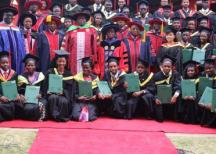The cauldron of corruption and lies has been boiling non-stop 24 hours a day. The time has come to overturn it, for Haitians to begin to see the light of peace. Haiti is for all Haitians. – Fanmi Lavalas statement, 8 July 2018. Fanmi Lavalas is the party of former President Jean-Bertrand Aristide, Haiti’s first democratically elected president, and represents Haiti’s poor majority.
Features
-

The author talks about Bitcoin’s bid to get a share of Africa’s banking system, especially among the technology-savvy entrepreneurs.
-
The Saharawis of Africa’s last colony Western Sahara don’t have many friends in high places around the world. But if Jeremy Corbyn’s Labour wins the next United Kingdom election it might prove to be a breakthrough in the protracted conflict and prevent a war.
-

A young Ugandan who is concerned about the current situation in the country sends an open letter to President Yoweri Museveni.
-

This article is framed around three important questions: Is the case of Bobi Wine, a youthful talented musician turned politician, taking on President Museveni something to be worried about? Is this the case of David vs. Goliath, or even “new wine in Uganda’s political wineskin? And should President Museveni be worried for his political future?
-

This paper deals with the meaning of Mwalimu Marcus Garvey and the Afrikan Revolution in the 21st century. Mwalimu Garvey is without doubt one of the most important figures of the Afrikan Revolution in the last 50 years and today, more than 70 years after his passing, his mission of total and unapologetic independence for the Black race, remains unfinished.
-

In this paper, the author argues that Professor Mahmood Mamdani’s essay, “The African University”, though timely, has significant flaws along several fronts including being a simplistic version of history, having major errors of fact and omissions, making unwarranted generalisation, and using unreal and extreme dichotomies among other flaws.
-

State brutality is integral to the electoral cycle in Yoweri Museveni’s Uganda. There are campaign beatings, ballot beatings and post-election beatings. When the election cycle is over, the country reverts to ordinary beatings.
Food & Health
-

The author, a public servant in the Department of Health of South Africa, offers an analytical view of the country's current state of the health sector, especially in rural areas of South Africa.
-

What kind of a moron appoints Robert Mugabe as goodwill ambassador for health? That is what the new Ethiopian-born Director General of the World Health Organization did – sparking global consternation. The appointment, now reversed, underlines one fact: Tedros Adhanom lacks what it takes to head even a village clinic.
-

Activists from anti-capitalist militant organizations in North Africa met in Tunis on 4th and 5th July 2017 to set up the North African Network for Food Sovereignty. The network is a unifying structure for struggles in the region and will be involved in local, continental and international mobilisation.
-

On 23 May 2017 Tedros Adhanom Ghebreyesus of Ethiopia was elected WHO Director-General. In a letter released a head of the election, over 200 scientists, policy experts and others concerned persons are urging the new Director-General to recognize and address factory farming as a growing public health challenge. Just as the WHO has bravely confronted companies that harm human health by peddling tobacco and sugar-sweetened beverages, it must not waver in advocating for the regulation of industrial animal farming.
Land Rights & Environment
-

After years of supporting a market-led land reform programme and not heeding criticisms of this policy, the African National Congress (ANC) leadership has adopted a radical policy of land expropriation without compensation, which would make it legal and within the constitutional bounds for the state to expropriate land in the public interest without compensation.
-

On 14 June 2018, the South African police fired rubber bullets at protestors, injuring five and arresting nine in Limpopo province. Another day and another protest is no longer newsworthy, especially if no one is killed and those arrested can be easily forgotten, as the wheels of the overburdened court system turn ever so slowly.
-

African farmers are facing serious challenges because of increased engineering of seeds and the determination of leading global agro-chemical corporations to dominate the African agricultural sector.
-

The article uses the Eco Marxist perspective to look at deforestation and the impact it has on Earth in terms of soil erosion, air pollution and the threat it places on plant and animal life.
-

This is a rejoinder to The Land Is Ours: South Africa’s First Black Lawyers and the Birth of Constitutionalism by Tembeka Nqcukaitobi. Contrary to the name of the book, “the land belongs to us” is not about land dispossession or land reform. It is about constitutionalism; the first generation of black lawyers; and how they used their “colonial education” experience to advance the struggle against discrimination and inequality in South Africa.
Arts & Book Reviews
Gender & Minorities
Governance
Land and Environment
Pan-Africanism
No front page content has been created yet.



























































